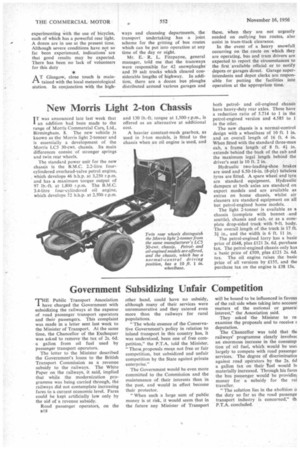Government Subsidizing Unfair Competition
Page 52

If you've noticed an error in this article please click here to report it so we can fix it.
THE Public Transport Association have charged the Government with subsidizing the railways at the expense of road passenger transport operators and their passengers. This complaint was made in a letter sent last week to the Minister of Transport. At the same time, the Chancellor of the Exchequer was asked to remove the tax of 2s. 6d. a gallon from oil fuel used by passenger transport operators.
The letter to the Minister described the Government's loans to the British Transport Commission as a revenue subsidy to the railways. The White Paper on the railways, it said, implied that while the modernization programme was being carried through, the railways did not contemplate increasing fares to a current economic level. Fares could be kept artificially low only by the aid of a revenue subsidy.
Road passenger operators, on the 1318
other hand, could have no subsidy, although many of their services were unremunerative and they catered even more than the railways for rural populations.
"The whole essence of the Conservative Government's policy in relation to inland transport in this country has, it was understood, been one of free competition," the P.T.A. told the Minister. " These proposals mean not free or fair competition, but subsidized and unfair competition by the State against private enterprise."
The Government would be even more committed to the Commission and the maintenance of their interests than in the past, and would in effect become their protector.
"When such a large sum of public money is at risk, it would seem that in the future any Minister of Transport
will be bound to be influenced in favour of the rail side when taking into account matters of the national or general interest," the Association said.
They asked the Minister to reexamine the proposals and to receive a deputation.
The Chancellor was told that th( railways' programme clearly involvec an enormous increase in the consump tion of oil fuel, which would be use largely to compete with road passengei services. The degree of discriminatior against road operators by the 2s. 6d a gallon tax on their 'Nei would bo materially increased. Through his fares the bus passenger would be providim money for a subsidy for the rai traveller.
"The solution lies in the abolition o the duty so far as the road passenge transport industry is concerned," th P.T.A. concluded.




















































































































